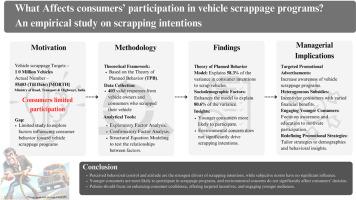是什么影响了消费者参与汽车报废计划?关于报废意向的实证研究
IF 9.7
1区 环境科学与生态学
Q1 ENGINEERING, ENVIRONMENTAL
引用次数: 0
摘要
本研究探讨了消费者对报废报废汽车(ELV)的意向,以了解汽车报废政策可如何缓解过时汽车尾气排放造成的环境恶化。研究的目的是利用基于计划行为理论(TPB)的模型,评估影响消费者决定报废车辆的因素。研究从 403 份有效回复中收集了数据,并使用探索性因素分析、确认性因素分析和结构方程模型对数据进行了分析。研究结果表明,原始 TPB 模型占消费者报废车辆意向变异的 58.3%。然而,将社会人口变量纳入模型后,解释方差增加到了 80.6%,其中感知行为控制是影响最大的因素,其次是消费者态度。我们发现,主观规范并不影响消费者参与报废汽车计划的意愿。总之,虽然消费者报废车辆的意愿主要受控制和态度的影响,但需要采取有针对性的干预措施来促进政策的采纳。主要的管理意义包括:通过量身定制的广告促进消费者的接受度,提供差异化的补贴,通过宣传活动吸引年轻受众,以及重新定义推广策略以有效鼓励电子学习车辆的报废。本文章由计算机程序翻译,如有差异,请以英文原文为准。

What affects consumer’s participation in vehicle scrappage programmes? An empirical study on scrapping intentions
This study examines consumer intentions toward scrapping End-of-Life vehicles (ELVs) to understand how vehicle scrappage policies might alleviate environmental deterioration caused by emissions from outdated vehicles. The research objective is to assess the factors influencing consumer decisions regarding vehicle scrappage, using a model grounded in the Theory of Planned Behavior (TPB). Data was collected from 403 valid responses and analyzed using exploratory factor analysis, confirmatory factor analysis, and structural equation modeling.The findings reveal that the original TPB model accounts for 58.3% of the variance in consumer intentions to scrap vehicles. However, incorporating sociodemographic variables into the model increases the explained variance to 80.6%, with perceived behavioral control as the most influential factor, followed by consumer attitudes. We found that subjective norms do not influence consumers' intentions to participate in scrappage programs. Younger consumers were more likely to support vehicle scrappage, while environmental concerns alone did not foster a positive attitude toward scrappage.In conclusion, while consumer intentions to scrap vehicles are primarily influenced by control and attitude, targeted interventions are needed to enhance policy adoption. Key managerial implications include: promoting acceptance through tailored advertisements, offering differentiated subsidies, engaging younger audiences through awareness campaigns, and redefining promotional strategies to encourage ELV scrappage effectively.
求助全文
通过发布文献求助,成功后即可免费获取论文全文。
去求助
来源期刊

Journal of Cleaner Production
环境科学-工程:环境
CiteScore
20.40
自引率
9.00%
发文量
4720
审稿时长
111 days
期刊介绍:
The Journal of Cleaner Production is an international, transdisciplinary journal that addresses and discusses theoretical and practical Cleaner Production, Environmental, and Sustainability issues. It aims to help societies become more sustainable by focusing on the concept of 'Cleaner Production', which aims at preventing waste production and increasing efficiencies in energy, water, resources, and human capital use. The journal serves as a platform for corporations, governments, education institutions, regions, and societies to engage in discussions and research related to Cleaner Production, environmental, and sustainability practices.
 求助内容:
求助内容: 应助结果提醒方式:
应助结果提醒方式:


